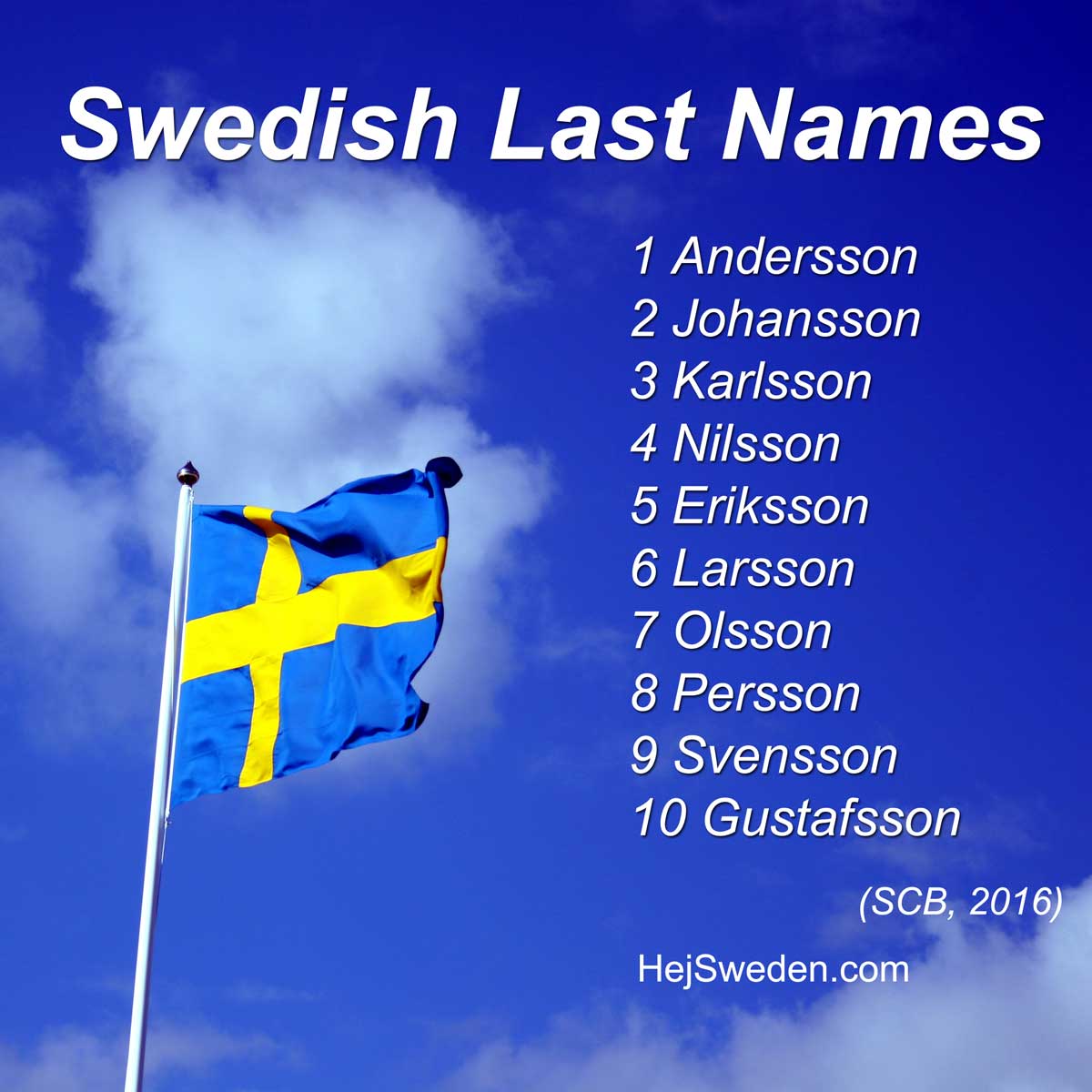Swedish last names hold a rich tapestry of cultural history, tracing back to ancient Scandinavian traditions and customs. These surnames often provide insights into ancestry, geographical origins, and even occupations of the past. As you delve into the world of Swedish last names, you'll discover a fascinating blend of historical significance and a reflection of Sweden's cultural evolution over centuries.
From patronymic naming conventions to names derived from nature and geographical features, Swedish last names serve as windows into the past. The naming traditions in Sweden have evolved through various periods, influenced by factors such as migration, trade, and social changes. Today, while some traditional naming practices have changed, the legacy of Swedish last names continues to resonate, offering a unique glimpse into the Scandinavian way of life.
As globalization and modernization shape societies worldwide, understanding the origins and meanings of Swedish last names becomes even more significant. These names not only connect individuals to their heritage but also highlight the rich linguistic and cultural diversity of the Nordic region. In this article, we'll explore the intriguing aspects of Swedish last names, uncovering their origins, meanings, and the stories they tell.
What are the Origins of Swedish Last Names?
Swedish last names have a rich and varied history, with origins deeply rooted in ancient Scandinavian traditions. The primary influence on Swedish surnames has been the patronymic system, where a child's last name is derived from the father's first name. This system resulted in names like "Andersson" (son of Anders) and "Johansson" (son of Johan). However, over time, other influences such as nature, geographical features, and occupations have also played a significant role in shaping Swedish last names.
How Did Nature Influence Swedish Last Names?
Nature has been a significant source of inspiration for Swedish last names. The country's stunning landscapes, with its forests, lakes, and mountains, have led to the adoption of names that reflect elements of the natural world. For example, names like "Berg" (mountain), "Lind" (lime tree), and "Ström" (stream) are derived from natural features, reflecting the deep connection Swedes have with their environment.
What Role Did Occupations Play in Swedish Last Names?
Occupations have also influenced Swedish last names, providing insights into the professions of ancestors. Names like "Smed" (blacksmith) and "Fisk" (fisherman) indicate the trade or occupation of individuals and their families. These occupational names not only reveal the economic activities prevalent in historical Swedish societies but also offer a glimpse into the social structure of the time.
How Have Swedish Last Names Evolved Over Time?
The evolution of Swedish last names is a testament to the dynamic nature of language and culture. As Sweden moved from a primarily agrarian society to a more urbanized and industrialized nation, naming conventions have also changed. The 19th and 20th centuries saw a shift from patronymic names to more standardized surnames, a change driven by modernization and the need for clear identification in growing urban centers.
Why Did the Patronymic System Decline?
The decline of the patronymic system in Sweden can be attributed to several factors, including administrative needs and societal shifts. As Sweden became more urbanized, the need for consistent and hereditary surnames became apparent. The introduction of mandatory military service, tax systems, and increased record-keeping required a more stable naming convention, leading to the gradual replacement of patronymic names with fixed surnames.
How Do Modern Swedish Last Names Reflect Cultural Diversity?
In contemporary Sweden, last names reflect the country's growing cultural diversity. Immigration and globalization have introduced new names and naming conventions, enriching the traditional Swedish surname landscape. Today, it's not uncommon to encounter Swedish last names that reflect a blend of different cultures, showcasing the country's openness and integration of diverse communities.
What Are Some Common Swedish Last Names?
Several Swedish last names have gained popularity over the years, with some remaining consistently common throughout the country's history. Here are some of the most common Swedish last names:
- Andersson
- Johansson
- Nilsson
- Svensson
- Larsson
- Olsson
- Persson
- Karlsson
These names are deeply rooted in the patronymic tradition and remain prominent in Swedish society, reflecting the country's historical naming practices.
How Can One Trace Their Swedish Ancestry Through Last Names?
Tracing Swedish ancestry through last names can be a rewarding journey for those interested in uncovering their family history. Genealogical research often begins with understanding the origins and meanings of last names, providing clues about geographical roots and family lineage. Several resources, such as church records, census data, and historical archives, are available to aid in this exploration.
What Resources Are Available for Swedish Genealogical Research?
For those interested in tracing their Swedish ancestry, numerous resources are available to assist in genealogical research:
- Swedish National Archives: The archives house a wealth of historical records, including church books, tax records, and census data.
- Genealogical Societies: Organizations such as the Swedish Genealogical Society offer support and resources for family history research.
- Online Databases: Websites like Ancestry.com and MyHeritage provide access to Swedish historical records and family trees.
By utilizing these resources, individuals can uncover the stories behind their Swedish last names and connect with their heritage in meaningful ways.
Conclusion: The Enduring Legacy of Swedish Last Names
Swedish last names are more than mere labels; they are a testament to the country's rich cultural heritage and historical evolution. From their origins in patronymic traditions to their modern-day diversity, these surnames offer a glimpse into Sweden's past, present, and future. By understanding and appreciating the stories behind Swedish last names, individuals can connect with their roots and celebrate the unique tapestry of Scandinavian culture.




